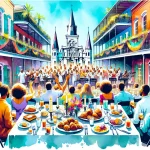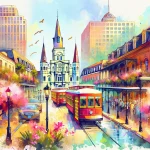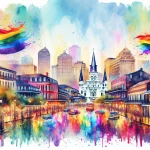African American Music Appreciation Month is an annual celebration held in June to recognize the profound influence and impact of African American music on American culture and heritage. New Orleans, renowned for its rich musical history and vibrant African American community, plays a significant role in this celebration. The city’s unique blend of African, European, and Caribbean influences has given birth to various musical genres that have shaped the cultural identity of not only New Orleans but the entire United States.
In This Article
TL;DR
- New Orleans birthed various influential African American musical styles like jazz, blues, and gospel
- The city hosts numerous festivals and events throughout June to honor African American Music Appreciation Month
- African American music has been instrumental in shaping the cultural identity of New Orleans
New Orleans has been a melting pot of musical influences since the 19th century. African American musical traditions, such as jazz and blues, originated in the city’s African American communities. The birth of jazz can be traced back to the late 19th and early 20th centuries in New Orleans, where African American musicians blended African rhythms, European harmonies, and improvisation to create a new and exciting musical genre.
Notable African American Musicians from New Orleans
Notable musicians like Louis Armstrong, Jelly Roll Morton, and Mahalia Jackson have roots in New Orleans. Armstrong, born in 1901, grew up in a poor neighborhood of New Orleans and learned to play the cornet at a young age. He went on to become one of the most influential jazz musicians of all time, known for his distinctive voice and virtuosic trumpet playing. Jelly Roll Morton, another New Orleans native, was a pianist, composer, and bandleader who helped to establish jazz as a distinct musical genre in the early 20th century. Mahalia Jackson, born in 1911, was a gospel singer who became known as the “Queen of Gospel” and played a significant role in the Civil Rights Movement.
Musical Genres Influenced by African American Music
New Orleans is home to a wide range of musical genres and styles that have been influenced by African American music. Jazz, which originated in the city, is characterized by its unique blend of African rhythms, European harmonies, and improvisation. The city also has a rich blues tradition, with many legendary blues musicians hailing from New Orleans, such as Professor Longhair and Dr. John. Gospel music has deep roots in the city’s African American churches and has influenced other genres, including soul and R&B.
Events and Festivals Celebrating African American Music
Throughout the month of June, New Orleans hosts numerous festivals and events that celebrate African American music. The New Orleans Jazz & Heritage Festival, held annually in late April and early May, showcases a wide range of African American musical genres, including jazz, blues, gospel, and funk. The festival features both local and international artists and attracts thousands of visitors each year. The Essence Festival, held annually in July, celebrates African American culture, music, and empowerment. The festival features live performances by top African American artists, as well as workshops, seminars, and exhibits. Satchmo SummerFest, held in August, is a festival dedicated to the life and music of Louis Armstrong, one of New Orleans’ most famous musicians.
Music Venues and Clubs
New Orleans is also home to many iconic music venues and clubs that have played a significant role in the development and preservation of African American music. Preservation Hall, located in the French Quarter, has been showcasing traditional New Orleans jazz since the 1960s. The venue features nightly performances by local jazz musicians and has become a must-visit destination for music lovers from around the world.
Address: 726 St Peter St, New Orleans, LA 70116
Phone: (504) 522-2841
Hours: Nightly shows at 5 PM, 6 PM, 8 PM, 9 PM, and 10 PM
Ticket prices: $20-$50
The Spotted Cat Music Club, located on Frenchmen Street, is another popular spot for live jazz, blues, and funk music. The club features both local and touring artists and has a lively, intimate atmosphere.
Address: 623 Frenchmen St, New Orleans, LA 70116
Phone: (504) 943-3887
Hours: Open daily from 2 PM to 2 AM
Cover charge: $5-$10
Tipitina’s, located in the Uptown neighborhood, is an iconic music venue that has hosted many legendary African American musicians, including Dr. John, the Neville Brothers, and the Meters.
Address: 501 Napoleon Ave, New Orleans, LA 70115
Phone: (504) 895-8477
Hours: Varies depending on event schedule
Ticket prices: Varies depending on event
Educational Initiatives and Community Engagement
In addition to its vibrant music scene, New Orleans also offers educational initiatives that aim to preserve and promote the city’s African American musical heritage. The New Orleans Jazz National Historical Park, located in the French Quarter, offers educational programs and exhibits on the history of jazz in New Orleans. The park also features live performances by local jazz musicians and offers guided tours of historic jazz sites throughout the city.
Address: 916 North Peters Street, New Orleans, LA 70116
Phone: (504) 589-4841
Hours: Tuesday-Saturday, 9 AM to 4:30 PM
Admission: Free
The New Orleans Jazz Museum, located in the Old U.S. Mint building, features interactive exhibits and artifacts related to the city’s jazz history, including instruments, photographs, and recordings.
Address: 400 Esplanade Ave, New Orleans, LA 70116
Phone: (504) 568-6993
Hours: Tuesday-Sunday, 10 AM to 4:30 PM
Admission: $8 for adults, $6 for seniors and students, free for children under 12
Many schools and community organizations in New Orleans also offer music education programs focused on African American musical traditions. These programs aim to pass down musical knowledge and skills to younger generations and ensure that the city’s rich musical heritage is preserved for years to come.
Impact and Legacy
African American music has had a profound impact on the community in New Orleans. It has been a source of pride and identity for the city’s African American community and has played a role in social and political movements, such as the Civil Rights Movement. The music industry has also provided economic opportunities for African American musicians and entrepreneurs in New Orleans, with many local artists and businesses thriving in the city’s vibrant music scene.
Efforts to preserve and promote African American musical heritage in New Orleans are ongoing. Archival projects and oral history initiatives aim to document the stories and experiences of African American musicians, while mentorship and education programs seek to pass down musical traditions to younger generations. These efforts ensure that the legacy of African American music in New Orleans will continue to thrive for generations to come.
African American Music Appreciation Month is a time to celebrate the rich musical heritage of New Orleans and the profound impact that African American music has had on American culture. From jazz and blues to gospel and funk, the city’s musical traditions have shaped the cultural identity of not only New Orleans but the entire United States. Through festivals, events, educational initiatives, and community engagement, New Orleans continues to preserve and promote its African American musical heritage, ensuring that the legacy of this important cultural tradition will endure for generations to come.






